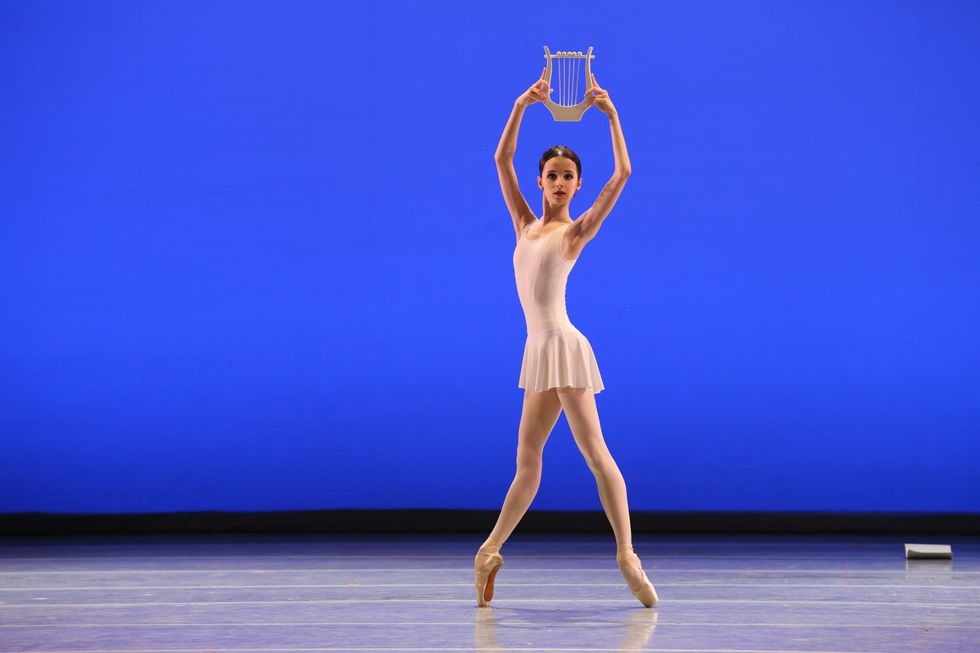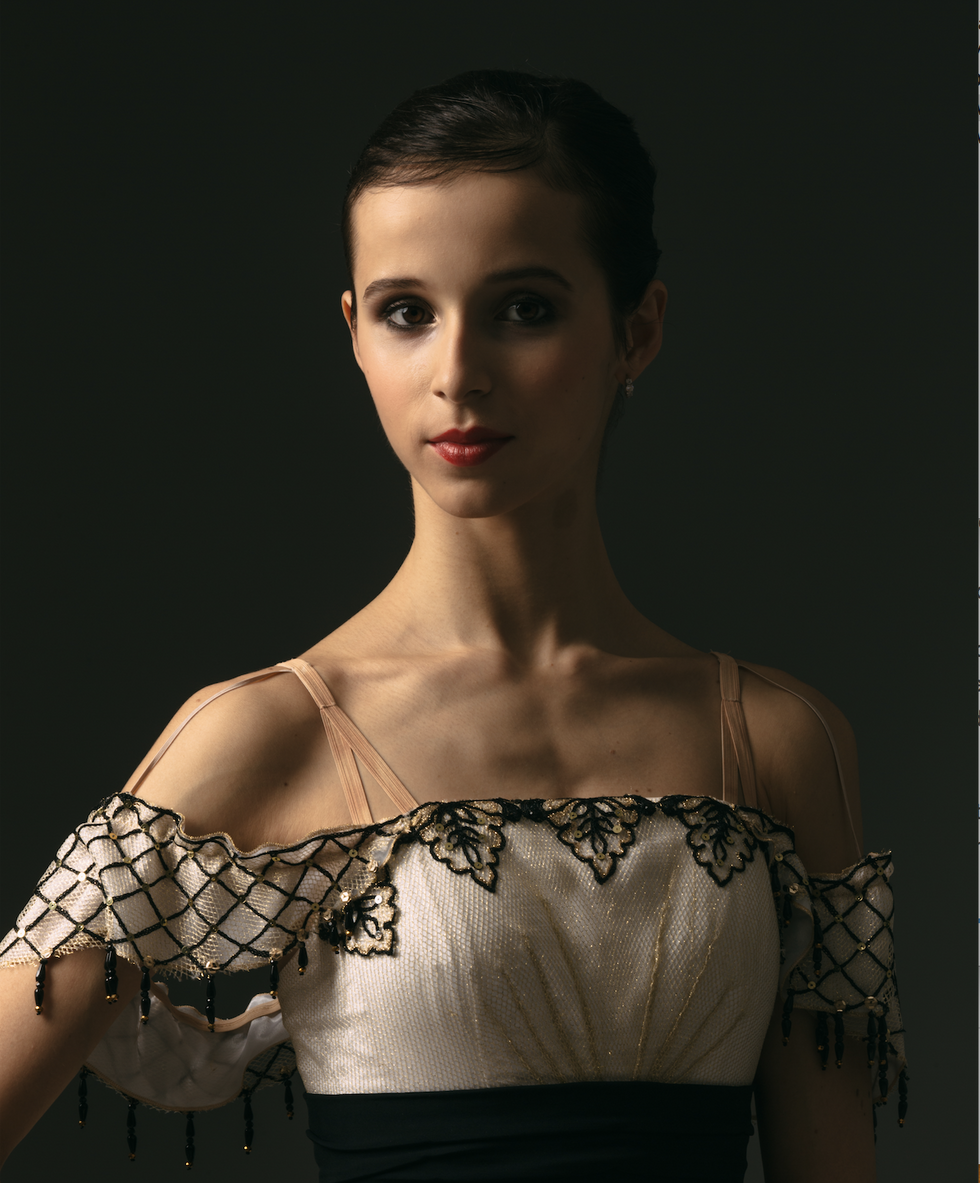The Insta-Ballerina: How Mariinsky Newcomer Maria Khoreva Shot to Stardom
The pleasure of watching prodigies perform technical feats on Instagram can be tinged with a sense of trepidation. Impressive tricks, you think, but do they have what it takes for an actual career?
Just look at 18-year-old Maria Khoreva, who has more followers than most seasoned principals; in videos, her lines and attention to detail suggested a precocious talent, and led to a Nike ambassador contract before she even graduated from the Vaganova Ballet Academy. Still, when she joined the Mariinsky Ballet last summer, there was no guarantee any of it would translate to stage prowess.

Apollo Natasha Razina, Courtesy State Academic Mariinsky Theatre
Yet it has, and fast. Less than a year later, Khoreva is already a first soloist, touted as one of the most important talents to join the venerable Russian company in recent years.
A star turn in Balanchine’s Apollo, alongside British principal Xander Parish, was swiftly followed by leading roles in full-length ballets. Her debut in Paquita last fall, captured and shared on social media (naturally), showed astonishing self-possession: She sailed through variations with rare lightness, topping them off with a sharp set of fouettés—Khoreva’s first ever as a professional—that barely moved an inch.
Not that the young dancer herself was entirely satisfied. “I was worried a lot about stamina, and I didn’t really feel my legs when the third act came. It turned out okay-ish,” she says seriously, in impeccable English. (Her mother taught English.)
Still, Mariinsky’s acting director Yuri Fateyev was taken by surprise. “I was shocked by how she presented herself, how strong and clean she was,” he says. “In the theater we have a saying: ‘Now a ballerina is born.’ After Paquita, I felt like we had a newborn ballerina.” Parish puts it succinctly: “She is the next Diana Vishneva, in my opinion.”
Not unlike Vishneva, Khoreva is a lithe brunette with the kind of proportions—not too tall, but long-legged—that lend themselves to a range of roles, from Aurora to “Diamonds,” the latter of which she added to her repertoire this winter. She shares something else with the Russian star: her final teacher at the Vaganova Ballet Academy, 78-year-old Lyudmila Kovaleva, a legend who also trained Bolshoi principal Olga Smirnova.
“Every class with her is wonderful. It’s the combinations that she gives, the energy she puts into each correction,” says Khoreva. “She taught us how to move, how to do the movements energy-wise, how to make them stronger.”
A native of St. Petersburg, Khoreva started in rhythmic gymnastics class at age 3. She was already on an intensive track and had come second in a national competition when one day, at 10 years old, she walked past the Vaganova Ballet Academy with her mother. They noticed there were auditions a few days later. Her parents, both ballet aficionados, frequently took Khoreva to see performances, and they decided to give it a try.
Khoreva got in but initially struggled. “I was really lost. It was both hard and too easy, not as intense as gymnastics.” Her mind-set only shifted when she saw classmates making strides. “One girl wasn’t physically gifted, but she was doing a great job and she got the same mark as me in an exam. It was a turning point for me. I realized that it mattered, that I should have goals.”
Fateyev first noticed Khoreva shortly after she returned from a serious Achilles inflammation that sidelined her for over six months when she was 15. “Lyudmila Kovaleva told me about a very talented girl, but she was very worried about her injury,” he says. “Maria was weak, but I thought if she developed well, she’d be good in the future.”
When he came back two years later, he was impressed not just with Khoreva, but with the entire class Kovaleva had nurtured. Taking a page from Balanchine’s book, he decided to cast three “baby ballerinas”—Khoreva and classmates Daria Ionova and Anastasia Nuykina—as the muses in Apollo, and started rehearsals with them before their final school year was even over.

It didn’t stop Khoreva from questioning where she wanted to start her career. She had received offers from six other companies, including the Bolshoi. Fateyev told her that she could dance Apollo and still go elsewhere. “But emotionally, from the first rehearsal, I knew that I would be joining this company,” Khoreva says.
The young dancers worked with Fateyev and Parish for two months. “When I first came in, Maria was ever so shy,” Parish remembers. “But we gelled very quickly. For someone so young, she’s extremely mature. She works with her head as much as with her body. And I’ve never seen such technique before. It’s phenomenal. I’m holding her, and thinking, Everything is just perfect. There’s nothing wrong at all.”
That, along with nerves of steel, prompted Fateyev to promote her to first soloist last fall, during her performances of Apollo at the Balanchine festival at New York City Center. He acknowledges that it’s fast but says, “It’s necessary to show her and the ballet world how we appreciate talented people. She will be one of the company’s main ballerinas in the future.”
For Khoreva, however, everything about life as a professional dancer feels new. “I’m still trying to figure out who is who, what is better for me, how I should build my day.” She gets nervous before performances, she adds, although a monthlong tour to Asia taught her to go with the flow. “We missed a connecting flight in Beijing, and we had to dance the next day. When you have these stressful situations, you become calmer, in a way.”
As is the tradition in Russia, Khoreva was assigned a personal coach, Elvira Tarasova. Together, they prepared the role of Medora in Le Corsaire ahead of the Mariinsky’s tour to Washington, DC, in April. “She can be quite strict, but she is very supportive, and she gives me as much as I need,” Khoreva says.
And she has found ready support within the company. “The stories that people tell about the Mariinsky, that everyone is evil—it’s not true. All the dancers have been kind, generous and supportive. Of course, I feel the pressure, but they make it so much easier.”
Khoreva created her Instagram account (@marachok) in 2014, at her father’s suggestion. “I studied how it worked, the hashtags, how to get followers, and I tried to develop my personal style in photos and videos, to make them visually beautiful,” she says. Her profile raised considerably when she was featured on the main @Instagram account—not just for Russia, but internationally—and she now has more than 288K followers.
Alongside carefully crafted images, she writes personal thoughts and motivational messages in English nearly every day. “Editing the visual content takes less time than writing the captions. After a long day, I have a lot to say, to share, and I try to give it a structure, which can take up to 40 minutes.”
Khoreva approaches her account with characteristic seriousness. Posting while on tour has proven especially challenging. “Instagram isn’t allowed in China, so we had to use a VPN for redirecting the Wi-Fi to another country. It was very hard. Sometimes I needed to stay up really late at night to still post something.” She says she doesn’t feel a responsibility to keep up the stream of content for the sake of building followers, however. “I just need to share these moments, because they’re amazing for me.”
Khoreva still lives with her family. Her father, who works in IT, helps her navigate the attention that comes with her career, and she has a 15-year-old sister who is also training at the Vaganova Ballet Academy. She unwinds by watching beauty vloggers on YouTube. “It’s an obsession that started when I got my injury.”
With her language skills and international following, the future is bright if Khoreva ever decides to work abroad. Alongside the classical repertoire, she hopes to dance works by Sir Kenneth MacMillan, Alexei Ratmansky and Christopher Wheeldon, yet remains strikingly cautious when discussing her meteoric rise, as if it hasn’t quite sunk in yet. “She’s not arrogant. She genuinely loves her art form,” says Parish. Khoreva herself put it best in an Instagram caption: “For me nothing is a better motivation to work harder than the work itself.” 18,314 of her followers approved the sentiment.



